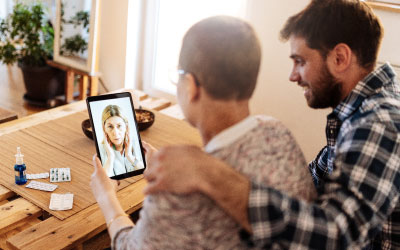Clinical Trial Myths and Facts
Researchers estimate that only around 6% of people with cancer across the United States participate in cancer clinical trials. It’s possible that misconceptions about clinical trials keep more people from participating.
Knowing the facts may help people to feel more comfortable participating in research.
The animated video, "Clinical Trials: Myths and Truths" (right) highlights some common misconceptions about clinical trials, and what is actually true. Thank you to Eytan Stein, MD, leukemia expert at Memorial Sloan Kettering Cancer Center, for contributing to the video.
Myth: You can only join clinical trials at the clinic where you receive treatment
Fact: You can participate in any clinical trial that is recruiting volunteers. Your primary cancer doctor doesn’t have to oversee the clinical trial.
Tell your doctor if you’ve found a study that interests you. Your doctor can assess whether you meet the requirements to join that particular study. If you meet the requirements, your doctor and clinic staff can send your medical records to the clinical trial team.
Myth: Children can’t join clinical trials
Fact: Many clinical trials research treatments for conditions or diseases affecting children. Children can take part in clinical trials with their parents’ or legal guardian’s permission.
A member of the clinical trial team can explain the study to the child using pictures or words that children understand. If the child understands these concepts, the researchers may ask for the child’s written consent in addition to the parent or guardian.
Myth: You must have a terminal illness to participate in clinical trials
Fact: Some clinical trials focus on individuals with terminal illnesses, but many look for completely healthy volunteers, too. This approach allows researchers to compare how the treatment works in healthy people versus those with a specific condition or disease. Researchers in these trials often look at how effective new treatments are compared to existing treatments. These treatments may not always be for terminal illnesses.
Myth: Diversity in clinical trials doesn’t matter.
Fact: Increased diversity in research studies ensures more scientific accuracy in the collected data. Study results can apply to a wider range of people regardless of differences in ethnicity, age, or gender.
Myth: You can join a clinical trial only if you have tried all other options.
Fact: Every clinical trial is different. Some clinical trials test treatments to see how they work in people who have tried other medications. Other trials test treatments in people before they use any other medications or try specific medications.
Partial myth: You will only get a placebo or “sugar pill” and not the new treatment.
Fact: Cancer clinical trials very rarely use a placebo. Placebo is only used when no standard treatment exists for a specific type of cancer. In this case, the researchers compare the new treatment developed to treat this specific type of cancer to the placebo.
Usually, one group receives the new treatment while another receives the best available treatment—or standard of care—plus a placebo. Anyone with cancer participating in a clinical trial should receive some form of treatment for ethical reasons. The rare exception is when no effective treatment is readily available.
The research team discusses if the trial uses a placebo during the informed consent meeting with potential participants. Sometimes, people in the placebo group can receive the new treatment after the study ends or during planned follow-up studies. These options, if available, are explained on the consent form.
Myth: You can’t leave after joining a clinical trial.
Fact: You can withdraw or discontinue the clinical trial at any time for any reason.
Myth: You must stop your current treatments to participate in a clinical trial.
Fact: Some clinical trials may encourage participants to continue their current treatment plan. These clinical trials assess if the new treatment achieves the best results when combined with current treatments.
If current treatments don’t produce the expected results, clinical trials may offer access to new, more effective therapies. People can always return to previous treatments if they worked better or had fewer side effects.
Myth: Clinical trials are unsafe because they test new treatments.
Fact: The top priority during any clinical trial is participant safety. Every trial has some risk. But the United States Food and Drug Administration only allows human clinical trials after extensive preclinical research on the new treatment.
Researchers carefully monitor participants for any adverse (bad) reactions during treatment. Participants can also leave the study at any time. Some people choose to leave if the new treatment causes unwanted side effects or if they don’t see any benefits.
Myth: Joining a clinical trial puts my personal health information at risk.
Fact: When you consent to participate in a clinical trial, you must provide your health information to the clinical trial team. Before signing the consent form, the clinical trial investigators will discuss the following:
- what health information needs to be collected
- why it is important for the trial
- how the team will protect your personal information
The clinical trial team collects and reviews your medical records to assess your eligibility for clinical trial participation. After determining your eligibility, they remove any personally identifying information from your trial participant record. The researchers only keep relevant health-related information they need to study the trial results.
Personal identifying information includes your name, address, birthday, Social Security number, and any photos. Removing this information protects the identity of trial participants when the results are published.
In addition, the webinar video, “Clinical Trials: A Guide for Leukemia Patients and Caregivers,” addresses how leukemia treatment has been changed by clinical trials, how clinical trials are developed, and factors to think about if you are considering a clinical trial. It is presented by Karen Carlson, MD, PhD, from Medical College of Wisconsin.




